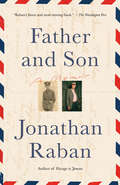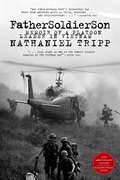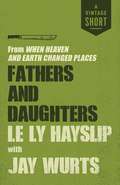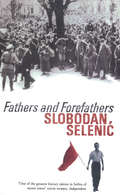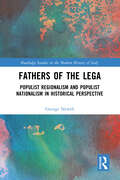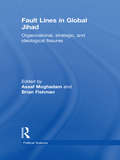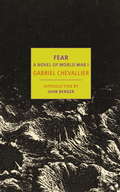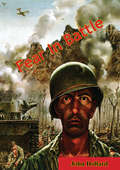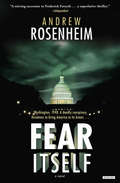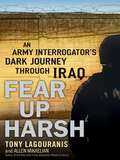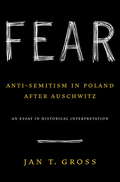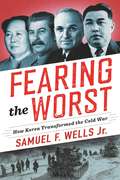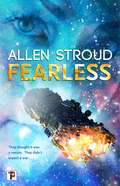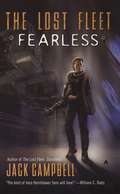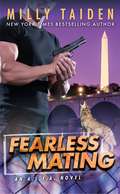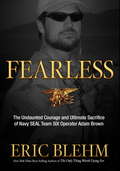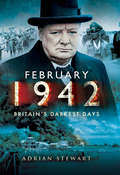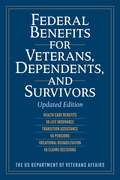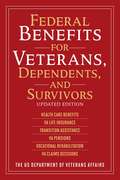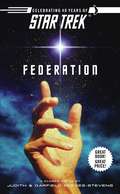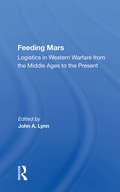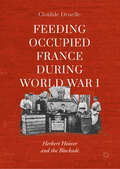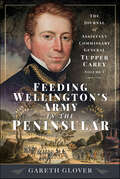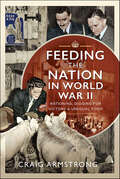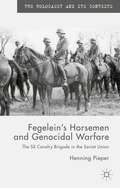- Table View
- List View
Father and Son: A Memoir
by Jonathan RabanA NEW YORKER BEST BOOK OF THE YEAR • A poignant memoir of love, trauma, and recovery after a life-changing stroke, twinned to a powerful account of his father's experience in World War II, by a winner of the National Book Critics Circle Award.&“A beautiful, compelling memoir...Raban&’s final work is a gorgeous achievement.&” —Ian McEwan, New York Times best-selling author of Lessons In June 2011, just days before his sixty-ninth birthday, Jonathan Raban was sitting down to dinner with his daughter when he found he couldn&’t move his knife to his plate. Later that night, at the hospital, doctors confirmed what all had suspected: that he had suffered a massive hemorrhagic stroke, paralyzing the right side of his body. Once he became stable, Raban embarked on an extended stay at a rehabilitation center, where he became acquainted with, and struggled to accept, the limitations of his new body—learning again how to walk and climb stairs, attempting to bathe and dress himself, and rethinking how to write and even read.Woven into these pages is an account of a second battle, one that his own father faced in the trenches during World War II. With intimate letters that his parents exchanged at the time, Raban places the budding love of two young people within the tumultuous landscape of the war&’s various fronts, from the munition-strewn beaches of Dunkirk to blood-soaked streets of Anzio. Moving between narratives, his and theirs, Raban artfully explores the human capacity to adapt to trauma, as well as the warmth, strength, and humor that persist despite it. The result is Father and Son, a powerful story of mourning, but also one of resilience.
Father, Soldier, Son: Memoir of a Platoon Leader In Vietnam
by Nathaniel Tripp"Father, Soldier, Son will stand as one of the finest soldier memoirs of the Vietnam War . . . If all that has been written about the war in Vietnam, in fiction and nonfiction, has made it a familiar story to some, Tripp overcomes cliché by individualizing every well-known fact." -- The Boston GlobeNATHANIEL TRIPP GREW UP fatherless in a house full of women and he arrived in Vietnam as a just-promoted second lieutenant in the summer of 1968 with no memory of a man's example to guide and sustain him. The father missing from Tripp's life had gone off to war as well, in the Navy in World War II, but the terrors were too much for him, he disgraced himself, and after the war ended he could not bring himself to return to his wife and young son. In "some of the best prose this side of Tim O'Brien or Tobias Wolff" (Military History Quarterly), Tripp tells of how he learned as a platoon leader to become something of a father to the men in his care, how he came to understand the strange trajectory of his own mentally unbalanced father's life, and how the lessons he learned under fire helped him in the raising of his own sons."Not since Michael Herr's Dispatches has there been anything quite as vivid, gripping and soul-searing," raved the Washington Post, and the Chicago Tribune said "the description of combat in the jungles of Vietnam are authentic and terrifying, as good as any I have read in fact or fiction."
Fathers and Daughters: from When Heaven and Earth Changed Places
by Le Ly Hayslip Jay WurtsThe youngest of six children in a close-knit Buddhist family, Le Ly Hayslip was twelve years old when U.S. helicopters landed in Ky La, her tiny village in central Vietnam. As the government and Viet Cong troops fought in and around Ky La, both sides recruited children as spies and saboteurs. Le Ly was one of those children. In this harrowing selection from the memoir of a girl on the verge of womanhood in a world turned upside down is a poignant picture of Vietnam, then and now, and of a courageous woman who experienced the true horror of the Vietnam War—and survived to tell her unforgettable story.A Vintage Shorts Vietnam Selection. An ebook short.
Fathers and Forefathers
by Slobodan SelenicA touching story of cultural difference and tested loyalties. Set in Belgrade before WWII, Fathers and Forefathers tells the story of the marriage between a Steven, a Serb, and Elizabeth, an Englishwoman. After meeting at an English university they marry and leave England to build their life together. Steven's narrative and Elizabeth's letters home reveal two very different personal accounts of the difficulties this involves. Raised in Serbia their son, Mihajlo, is ashamed of his mixed parentage and rebels against his non-Serbian ancestry. On the eve of the war, Steven's loyalties are challenged when his counsel is sought by both the Serbian king and the opposition. He resolves to keep his distance from the conflict, but Mihajlo's more radical response forces him to become involved, and tragedy engulfs the family.
Fathers of the Lega: Populist Regionalism and Populist Nationalism in Historical Perspective (Routledge Studies in the Modern History of Italy)
by George NewthThis book investigates the historical roots of the Italian Republic’s oldest surviving political party, the populist far right Lega (Nord), tracing its origins to post-war Italy. The author examines two main case studies: the Movements for Regional Autonomy (MRAs), the Piedmontese Movement for Regional Autonomy (the MARP) and the Bergamascan Movement for Autonomy (the MAB), both of which formed a first wave of post-war populist regionalism from 1955 until 1960. The regionalist leagues which later emerged in both Piedmont and Lombardy in the 1980s – and which would later form part of the Lega Nord – represented in many ways a revival of the MRAs’ populist regionalist discourse and ideology and, therefore, a second wave of post-war populist regionalism. Despite this, neither the MRAs nor the twenty year gap between these waves of activism have received the attention they deserve. Drawing on a series of archival and secondary sources this book takes an innovative approach which blends concepts and theories from historical sociology and political science. It also provides a nuanced examination of the continuities and discontinuities between the MRAs and the Lega from the 1950s until time of publication. This contributes to debates not only in contemporary Italian history, but also populism and the far right. While rooted in historical approaches, the book’s interdisciplinarity makes it suitable for students and researchers across a variety of subject areas including European history, modern history, and political history.
Fault Lines in Global Jihad: Organizational, Strategic, and Ideological Fissures (Political Violence)
by Assaf Moghadam Brian FishmanThis book deals with the causes, nature, and impact of the divisions within the jihadi movement, and the splits between jihadis and other Islamic groups. Fault Lines in Global Jihad offers a systematic and comprehensive examination of the broad range of divisions that contribute to the weakening of the jihadi movement. It separates these divisions into two broad categories, namely fissures dividing jihadis themselves, and divisions separating jihadis from other Muslim and Islamist groups. The first part of the book covers intra-jihadi divisions, highlighting tensions and divisions over strategic, tactical, and organizational issues. The second part of the book addresses several important case studies of jihadi altercations with other Muslim and Islamist groups of non-jihadi persuasion, such as the Muslim Brotherhood, Hamas, and the Shii community. More than simply an enumeration of problems and cracks within al-Qa’ida and its cohorts, this book addresses critical policy issues of relevance to the broader struggle against the global jihadi movement. The editors conclude that these divisions have and continue to weaken al-Qa’ida, but neither in an automatic nor in an exclusive fashion—for these divisions render the global jihadi movement simultaneously vulnerable and more resilient. This book will be of much interest to students of jihadism, terrorism and political violence, Islamism, security studies and IR in general.
Fear
by John Berger Malcolm Imrie Gabriel ChevallierAn NYRB Classics Original Winner of the Scott Moncrieff Prize for Translation1915: Jean Dartemont heads off to the Great War, an eager conscript. The only thing he fears is missing the action. Soon, however, the vaunted "war to end all wars" seems like a war that will never end: whether mired in the trenches or going over the top, Jean finds himself caught in the midst of an unimaginable, unceasing slaughter. After he is wounded, he returns from the front to discover a world where no one knows or wants to know any of this. Both the public and the authorities go on talking about heroes--and sending more men to their graves. But Jean refuses to keep silent. He will speak the forbidden word. He will tell them about fear. John Berger has called Fear "a book of the utmost urgency and relevance." A literary masterpiece, it is also an essential and unforgettable reckoning with the terrible war that gave birth to a century of war.n the battlefield? He responds like a man: "I was afraid." Acclaimed as "the most beautiful book ever written on the tragic events that blood-stained Europe" for five years, prosecuted on first publication as an act of sedition, Fear appears for the first time in the United States in Malcolm Imrie's poetic and prizewinning translation on the hundredth anniversary of the outbreak of World War I, the conflict with which the twentieth century came into its own. Chevallier's masterpiece remains, in the words of John Berger, "a book of the utmost urgency and relevance."
Fear In Battle
by Donald Horton John DollardJohn Dollard (1900-1980) was a psychologist and social scientist best known for his studies on race relations in America. From 1942 to 1945 he served as a consultant in the Morale Services Division the United States Department of War, during which time he and fellow psychologists at Yale University's Institute of Human Relations produced a study titled "Fear and Courage under Battle Conditions." The study investigated fear and morale of soldiers in modern combat conditions. With the active assistance of the Veterans of the Abraham Lincoln Brigade interviews with Lincoln Brigade veterans were carried out and a questionnaire distributed. Three hundred veterans who had served as volunteers with the Abraham Lincoln Brigade during the Spanish Civil War replied and became the research subjects for the study.This book presents the findings from this intensive study for the purposes of military value.
Fear Itself: A Novel (The Jimmy Nessheim Novels #1)
by Andrew RosenheimA homegrown Nazi conspiracy threatens to destroy America in this historical FBI thriller: &“A stirring successor to Frederick Forsyth&” (The Independent). Washington, DC, 1940. Jimmy Nessheim, a young special agent in the fledgling FBI, is assigned to infiltrate a new German American organization known as the Bund. Ardently pro-Nazi, the Bund is conspiring to sabotage American efforts against Adolf Hitler. But Nessheim&’s investigation soon uncovers something far more sinister—and it leads directly to the White House. Drawn into the rarified world of Washington&’s high society, Nessheim is caught in a web of political intrigue, secret lives, and a lethal plot that could rewrite history. With sharp wit and a keen eye for period detail, author Andrew Rosenheim brings to life an America at the crucial period before it entered World War II. He seamlessly weaves into the narrative larger-than-life figures such as J. Edgar Hoover, Clyde Tolson, and Lucy Mercer Rutherford, as well as historical events like the 1939 pro-Nazi rally held at New York City&’s Madison Square Garden.
Fear Up Harsh
by Tony Lagouranis Allen Mikaelian"Something really bad happened here. " So begins Army interrogator Tony Lagouranis's first briefing at Abu Ghraib. While Lagouranis's training stressed the rules of the Geneva Conventions, once in Iraq, he discovered that pushing the legal limits of interrogation was encouraged. Under orders, he-along with numerous other soldiers-abused and terrorized Iraqis by adding "enhancements" like dogs, hypothermia, and other techniques to "Fear Up Harsh"-the official tactic designed to frighten prisoners into revealing information. And he saw others do far worse. The first Army interrogator to publicly step forward and break the silence surrounding these tactics, Lagouranis reveals what went on in Iraqi prisons- raising crucial questions about American conduct abroad. .
Fear: An Essay in Historical Interpretation
by Jan T. GrossPoland suffered an exceedingly brutal Nazi occupation during the Second World War. Close to five million Poles were killed. Of these, more than half were Jews killed in the Holocaust. Ninety percent of the world's second largest Jewish community was annihilated. But despite the calamity shared by Poland's Jews and non-Jews, anti-Semitic violence did not stop in Poland with the end of the war. Jewish Holocaust survivors returning to their Polish hometowns after the war experienced widespread hostility, including murder, at the hands of their neighbors. The bloodiest peacetime pogrom in twentieth-century Europe took place in Kielce, Poland, a year after the war ended. Jan Gross's Fear is a detailed reconstruction of this pogrom and the Polish reactions to it that attempts to answer a perplexing question: How was anti-Semitism possible in Poland after the war? Gross argues that postwar Polish anti-Semitism cannot be understood simply as a continuation of prewar attitudes. Rather, it developed in the context of the Holocaust and the Communist takeover: Anti-Semitism eventually became a common currency between the Communist regime and a society filled with people who had participated in the Nazi campaign of murder and plunder, people for whom Jewish survivors were a standing reproach. The Polish poet Czeslaw Milosz said that Poland's Communist rulers fulfilled the dream of Polish nationalists by bringing into existence an ethnically pure state. For more than half a century, what happened to Jewish Holocaust survivors in Poland has been cloaked in guilt and shame. Writing with passion, brilliance, and fierce clarity, Gross at last brings the truth to light.
Fearing the Worst: How Korea Transformed the Cold War (Woodrow Wilson Center Series)
by Dr. Samuel F. Wells Jr.After World War II, the escalating tensions of the Cold War shaped the international system. Fearing the Worst explains how the Korean War fundamentally changed postwar competition between the United States and the Soviet Union into a militarized confrontation that would last decades.Samuel F. Wells Jr. examines how military and political events interacted to escalate the conflict. Decisions made by the Truman administration in the first six months of the Korean War drove both superpowers to intensify their defense buildup. American leaders feared the worst-case scenario—that Stalin was prepared to start World War III—and raced to build up strategic arms, resulting in a struggle they did not seek out or intend. Their decisions stemmed from incomplete interpretations of Soviet and Chinese goals, especially the belief that China was a Kremlin puppet. Yet Stalin, Mao, and Kim Il-sung all had their own agendas, about which the United States lacked reliable intelligence. Drawing on newly available documents and memoirs—including previously restricted archives in Russia, China, and North Korea—Wells analyzes the key decision points that changed the course of the war. He also provides vivid profiles of the central actors as well as important but lesser known figures. Bringing together studies of military policy and diplomacy with the roles of technology, intelligence, and domestic politics in each of the principal nations, Fearing the Worst offers a new account of the Korean War and its lasting legacy.
Fearless (Fiction Without Frontiers)
by Allen Stroud&“Fast-paced, gripping hard SF with death in hard vacuum waiting at every turn.&” — Arthur C. Clarke Award winner Adrian TchaikovskyAD 2118. Humanity has colonised the Moon, Mars, Ceres and Europa. Captain Ellisa Shann commands Khidr, a search and rescue ship with a crew of twenty-five, tasked to assist the vast commercial freighters that supply the different solar system colonies. Shann has no legs and has taken to life in zero-g partly as a result. She is a talented tactician who has a tendency to take too much on her own shoulders. Now, while on a regular six-month patrol through the solar system, Khidr picks up a distress call from the freighter Hercules…FLAME TREE PRESS is the new fiction imprint of Flame Tree Publishing. Launched in 2018 the list brings together brilliant new authors and the more established; the award winners, and exciting, original voices.
Fearless (The Lost Fleet #2)
by Jack CampbellOutnumbered by the superior forces and firepower of the Syndicate Worlds, the Alliance fleet continues its dangerous retreat across the enemy star system. Led by the legendary Captain John "Black Jack" Geary who returned to the fleet after a hundred-year suspended animation, the Alliance is desperately trying to return home with its captured prize: the key to the Syndic hypernet and the key to victory... Geary is convinced that the Syndics are planning to ambush the fleet and finish it off once and for all. Realizing the fleet's best (and only) chance is to do the unexpected, Geary takes the offensive and orders the fleet to the Sancere system. There, a multitude of possible routes home give the Alliance fleet a better chance of avoiding their pursuers--and an attack on the Sancere shipbuilding facilities could decimate the Syndic war effort. Weary from endless combat, the officers and crew of the Alliance fleet can't see the sense in charging deeper into enemy territory, prompting a mutiny that divides them and leaves Geary with higher odds against him than ever before...
Fearless Mating (An A.L.F.A. Novel #4)
by Milly TaidenTheir jobs have set them at odds, but the attraction brewing between them is too strong to resist in this all-new paranormal romance from the author of Dangerous Mating.Sergeant Major Candace Obermier has arrived at Alpha League Federal Agency headquarters with one task in mind--shutting it down. While A.L.F.A.'s pledge to protect humans from paranormal threats is noble, they've caused nothing but mayhem as far as Candy can tell. And their director? He's the worst of the lot. Director Josh Tumbel has finally found his mate. And she's doing everything she can to shut down operations, while he struggles to control his mating instincts. But when A.L.F.A. headquarters is taken in a hostage situation, Josh has a chance to demonstrate the critical nature of the agency's existence, and prove his worth to Candy as a protector and lover.
Fearless: The Heroic Story of One Navy Seal's Sacrifice in the Hunt for Osama Bin Laden and the Unwavering Devotion of the Woman Who Loved Him
by Eric BlehmFearless takes you deep into SEAL Team SIX, straight to the heart of one of its most legendary operators. When Navy SEAL Adam Brown woke up on March 17, 2010, he didn't know he would die that night in the Hindu Kush Mountains of Afghanistan--but he was ready: In a letter to his children, not meant to be seen unless the worst happened, he wrote, "I'm not afraid of anything that might happen to me on this earth, because I know no matter what, nothing can take my spirit from me." Long before Adam Brown became a member of the elite SEAL Team SIX--the counterterrorism unit that took down Osama bin Laden--he was a fun-loving country boy from Hot Springs, Arkansas, whose greatest goal had been to wear his high school's football jersey. An undersized daredevil, prone to jumping off roofs into trees and off bridges into lakes, Adam was a kid who broke his own bones but would never break a promise to his parents.But after high school, Adam fell in with the wrong crowd and his family watched as his appetite for risk dragged him into a downward spiral that eventually landed him in jail. Battling his inner demons on a last-chance road to redemption, Adam had one goal: to become the best of the best--a US Navy SEAL. An absorbing chronicle of heroism and humanity, Fearless presents an indelible portrait of a highly trained warrior who would enter a village with weapons in hand to hunt terrorists, only to come back the next day with an armload of shoes and meals for local children. It is a deeply personal, revealing glimpse inside the SEAL Team SIX brotherhood that also shows how these elite operators live out the rest of their lives, away from danger, as husbands, fathers and friends. Fearless is the story of a man of extremes, whose courage and determination was fueled by faith, family, and the love of a woman. It's about a man who waged a war against his own worst impulses and persevered to reach the top tier of the US military. Always the first to volunteer for the most dangerous assignments, Adam's final act of bravery led to the ultimate sacrifice. Adam Brown was a devoted man who was an unlikely hero but a true warrior, described by all who knew him as fearless.
February 1942: Britain's Darkest Days
by Adrian StewartAs the saying goes 'it is darkest before the dawn' and so it was for Churchill and the British people during the Second World War.During February 1942, bad news of disasters came in an unbroken and seemingly endless sequence from the Far East to the Home Front. Some such as the Fall of Singapore and the Royal Navy's humiliation over the escape of the Scharhnhorst and Gneisenau are well known but always worth re-telling. Others less written about such as the challenge to Churchill at home, heavily strained relations with Commonwealth allies, the Japanese raid on Darwin and Rommel's return in North Africa were equally serious and full of foreboding for the future outcome of the War.February 1942 was in retrospect, the month in which many long-established beliefs were destroyed for ever. It was the month that confirmed that Britain no longer ruled the waves; that saw British prestige so damaged that it could never be fully restored; that foreshadowed and ensured the end of Britain's Empire; that demonstrated the immense strain that could be put on Britain's relations with the Commonwealth's self-governing Dominions. In short it was the month that changed Britain's world.It was also the month at the end of which Britain seemed likely to lose the War. Happily, this did not prove the case so perhaps February 1942 further shows that a country can receive terrible blows but still survive and endure.
Federal Benefits for Veterans, Dependents, and Survivors: Updated Edition
by The US Department of Veterans Affairs<p>Veterans of the United States armed forces may be eligible for a broad range of benefits and services provided by the US Department of Veterans Affairs (VA). If you’re looking for information on these benefits and services, look no further than the newest edition of <i>Federal Benefits for Veterans, Dependents, and Survivors</i>. <p>The VA operates the nation’s largest health-care system, with more than 1,700 care sites available across the country. These sites include hospitals, community clinics, readjustment counseling centers, and more. In this book, those who have honorably served in the active military, naval, or air service will learn about the services offered at these sites, basic eligibility for health care, and more. <p> <p>Helpful topics described in depth throughout these pages for veterans, their dependents, and their survivors include: <p> <li>Vocational rehabilitation and employment <li>VA pensions <li>Home loan guaranty <li>Burial and memorial benefits <li>Transition assistance <li>Dependents and survivors health care and benefits <li>Military medals and records <li>And more</li> </p>
Federal Benefits for Veterans, Dependents, and Survivors: Updated Edition
by The US Department of Veterans AffairsAn official, up-to-date government manual that covers everything from VA life insurance to survivor benefits. Veterans of the United States armed forces may be eligible for a broad range of benefits and services provided by the US Department of Veterans Affairs (VA). If you’re looking for information on these benefits and services, look no further than the newest edition of Federal Benefits for Veterans, Dependents, and Survivors. The VA operates the nation’s largest health-care system, with more than 1,700 care sites available across the country. These sites include hospitals, community clinics, readjustment counseling centers, and more. In this book, those who have honorably served in the active military, naval, or air service will learn about the services offered at these sites, basic eligibility for health care, and more. Helpful topics described in depth throughout these pages for veterans, their dependents, and their survivors include:Vocational rehabilitation and employmentVA pensionsHome loan guarantyBurial and memorial benefitsTransition assistanceDependents and survivors health care and benefitsMilitary medals and recordsAnd more
Federation (Star Trek )
by Garfield Reeves-Stevens JudithAt last! The long awaited novel featuring both famous crews of the Starship Enterprise in an epic adventure that spans time and space. Captain Kirk and the crew of the U.S.S. Enterprise NCC-1701 are faced with their most challenging mission yet--rescuing renowned scientist Zefram Cochrane from captors who want to use his skills to conquer the galaxy. Meanwhile, ninety-nine years in the future on the U.S.S. Enterprise NCC-1701-D, Picard must rescue an important and mysterious person whose safety is vital to the survival of the Federation. As the two crews struggle to fulfill their missions, destiny draws them closer together until past and future merge--and the fate of each of the two legendary starships rests in the hands of the other vessel...
Feeding Mars: Logistics In Western Warfare From The Middle Ages To The Present
by John A LynnMars must be fed. His tools of war demand huge quantities of fodder, fuel, ammunition, and food. All these must be produced, transported, and distributed to contending forces in the field. No one can doubt the importance of feeding Mars in modern warfare, and it takes no great effort to recognize that it has always been a major aspect of large scal
Feeding Occupied France during World War I: Herbert Hoover and the Blockade
by Clotilde DruelleThis book examines the history of Herbert Hoover’s Commission for Relief in Belgium, which supplied humanitarian aid to the millions of civilians trapped behind German lines in Belgium and Northern France during World War I. Here, Clotilde Druelle focuses on the little-known work of the CRB in Northern France, crossing continents and excavating neglected archives to tell the story of daily life under Allied blockade in the region. She shows how the survival of 2.3 million French civilians came to depend upon the transnational mobilization of a new sort of diplomatic actor—the non-governmental organization. Lacking formal authority, the leaders of the CRB claimed moral authority, introducing the concepts of a “humanitarian food emergency” and “humanitarian corridors” and ushering in a new age of international relations and American hegemony.
Feeding Wellington's Army in the Peninsula: The Journal of Assistant Commissary General Tupper Carey, Volume I
by Gareth GloverTranscribed for the first time from Commissary General Tupper Carey's handwritten journals, this is the first of two volumes which cover the lively career of a Commissary who served throughout the Peninsular war and Waterloo campaign. Written with vivid detail, these journals offer a truly unique window into the life of a Commissary and the campaigns in which he served. Although a civilian and greatly discouraged from putting himself in mortal danger, Tupper was often to be found watching the fighting from some nearby vantage point and often describes the actions he witnessed, particularly where it affected his own charge, whether a battalion, a brigade or even later an entire division. Interspersed with these primary roles, he was often seconded to form supply bases in the rear of the army, or to hastily remove or destroy stores when threatened by enemy advances. He also talks freely about fellow officers, and being a private journal written simply for the eyes of his immediate family, he is not shy in giving his honest opinions of both his subordinates or indeed his superiors. This first volume covers Tupper's early life, joining as a clerk and his early years as a Commissary up until the spring of 1813, just before the Duke of Wellington launched his troops on that memorable campaign, designed to drive the French back out of Spain, across the Pyrenees. Also detailed are Tupper's role in the Corunna campaign, The Border War, Battle of Salamanca and the Siege of Burgos. The rest of Tupper’s incredible career will be covered in the second volume.
Feeding the Nation in World War II: Rationing, Digging for Victory & Unusual Food
by Craig ArmstrongOne of the main dangers to Britain during the Second World War was the possibility of the country being starved out of the war. Indeed, it was what Churchill feared the most. Before the war, Britain was hugely dependent upon foreign imports of food and supplies, but with unrestricted submarine warfare these lifelines were in danger of being cut and the amount of imports hugely reduced. Britain was not unprepared. Lessons had been learned during the First World War, when people had been encouraged to grow more of their own food. The Ministry of Food, in particular, had detailed plans in the event of a future war and the ‘Dig for Victory’ campaign rightly went down in history as one of the great successes of the British Home Front. For the farmers of Britain the war meant a massive upheaval, as the government ordered them to plough up millions of acres of land to grow valuable arable crops. Meanwhile, with rationing a daily and inescapable part of life, the people of Britain had to get used to different foodstuffs, including powdered egg, Spam and even whale meat. Incredibly, the diets of many British people actually improved during the war and the fact that the country avoided starvation demonstrated not only the success of government planning, but also the determination and ingenuity of the wartime generation.
Fegelein's Horsemen and Genocidal Warfare
by Henning PieperThe SS Cavalry Brigade was a unit of the Waffen-SS that differed from other German military formations as it developed a 'dual role': SS cavalrymen both helped to initiate the Holocaust in the Soviet Union and experienced combat at the front.
